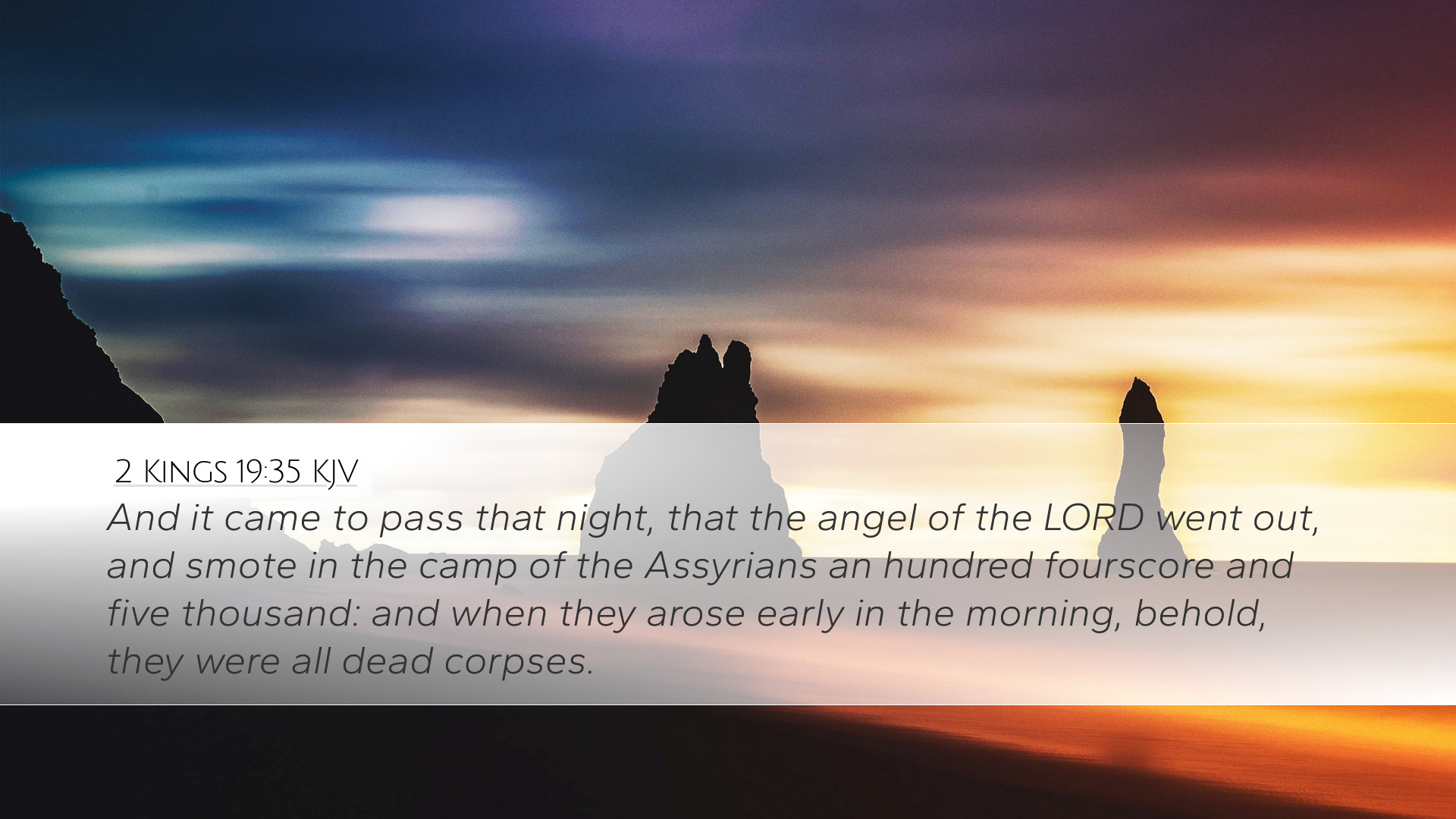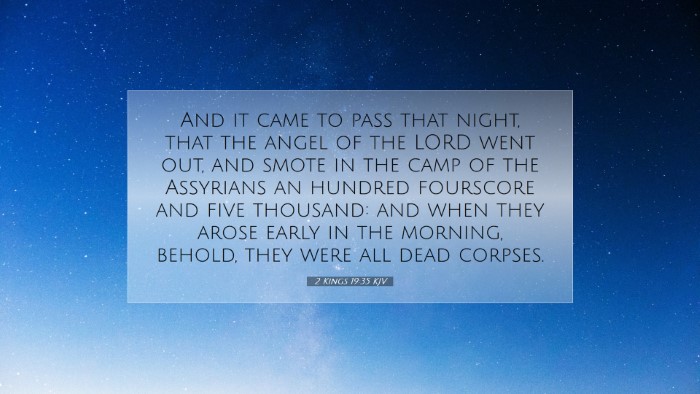Commentary on 2 Kings 19:35
Verse: “And it came to pass that night, that the angel of the Lord went out, and smote in the camp of the Assyrians a hundred and fourscore and five thousand: and when they arose early in the morning, behold, they were all dead corpses.”
Introduction
This passage marks a pivotal moment in the history of Israel during the reign of King Hezekiah, reflecting God's divine intervention in times of dire distress. The events encapsulated in this verse serve to illustrate both the power of God and the futility of human opposition to His will.
Contextual Background
Prior to this moment, the Assyrian king Sennacherib had laid siege to Jerusalem, threatening the kingdom of Judah. He had boasted of his victories over other nations and sought to instill fear by undermining the people's faith in God. Hezekiah responded to this crisis with earnest prayer, demonstrating a reliance on divine support rather than military might.
Divine Intervention
The crux of this verse lies in the concept of divine intervention. The angel of the Lord, a manifestation of God's immediate presence and action, is sent forth to execute judgment against the Assyrians. This act serves multiple purposes:
- Assurance for Believers: It reassures the faithful that God is their protector and deliverer.
- Judgment on the Wicked: The destruction of the Assyrian army illustrates God's sovereignty over nations and His willingness to judge those who oppose His purposes.
- Encouragement for Future Generations: The historical event serves as a testimony to God’s faithfulness, inspiring future leaders and individuals to trust in divine providence amidst trials.
Commentary Insights
Matthew Henry
Matthew Henry emphasizes the significance of prayer as Hezekiah turned to God in the face of overwhelming odds. He notes that the night before the deliverance was a key moment of spiritual warfare, where God acted in response to the king's earnest supplication. Henry suggests that the sudden destruction of the Assyrians mirrors God's past interventions for His people, encouraging believers to remain steadfast in prayer during their struggles.
Albert Barnes
Albert Barnes provides further theological reflection, asserting that the angel of the Lord represents the active force of divine will against those who challenge God's authority. He observes that this singular act of judgment serves as a reminder that human strength is ultimately impotent when opposed to the will of God. Barnes also highlights the numerical detail of "a hundred and fourscore and five thousand," indicating the magnitude of God's deliverance, which left no doubt in the minds of the people regarding God’s power.
Adam Clarke
Adam Clarke adds a unique perspective by discussing the nature of the angelic being that executed this judgment. He posits that the term "angel" can refer to various spiritual agents in the Scriptures, but here, it is indicative of God's direct intervention through a divinely appointed messenger. Clarke elaborates on the transformative impact of this event on the morale of the Israelites, bolstering their faith and encouraging them to remain loyal to God amidst threats.
Theological Implications
This passage reinforces key theological tenets regarding God’s sovereignty, providence, and judgment. Scholars recognize it as a potent reminder of God's faithfulness toward His chosen people, encapsulating the essence of covenant relationship. The act of deliverance not only serves the immediate need of protection but also stands as a theological testament to God's promises throughout history.
Application for Modern Believers
For contemporary Christians, 2 Kings 19:35 offers profound lessons:
- The Power of Prayer: Just as Hezekiah turned to God for deliverance, believers are encouraged to seek divine intervention in their own lives through prayer, especially in times of trouble.
- God’s Omnipotence: The event serves as a testimony to God’s supremacy over worldly powers and entities. Modern believers are reminded that no situation is beyond God's control.
- Encouragement Amidst Trials: The story encourages the faithful to remain steadfast, understanding that God is capable of executing His plans in unexpected ways.
Conclusion
2 Kings 19:35 stands as a powerful reminder of divine sovereignty and intervention. As the narrative unfolds, it presents an assurance of God's fidelity and power, serving both as a call to prayer and a source of hope for believers across generations. The insights gleaned from historical commentaries enhance our understanding and appreciation of this profound moment in biblical history, urging pastors, students, and theologians to delve deeper into the implications of God's actions on behalf of His people.


